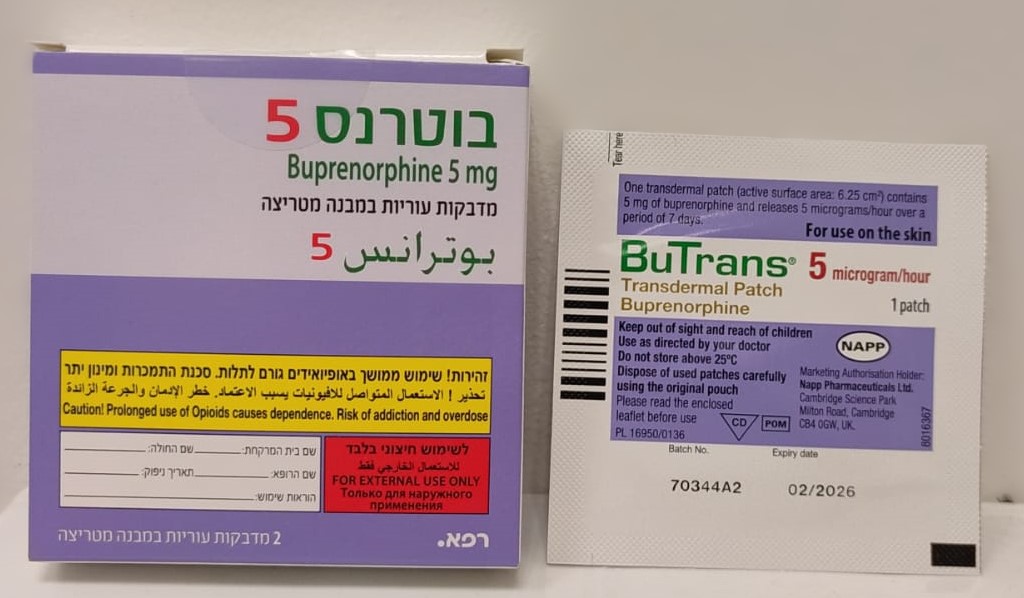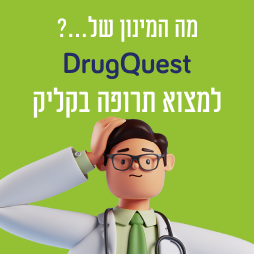Quest for the right Drug

בוטרנס 5 BUTRANS 5 (BUPRENORPHINE)
תרופה במרשם
תרופה בסל
נרקוטיקה
ציטוטוקסיקה
צורת מתן:
בין-עורי : TRANSDERMAL
צורת מינון:
מדבקות במבנה מטריצה : PATCHES MATRIX
עלון לרופא
מינוניםPosology התוויות
Indications תופעות לוואי
Adverse reactions התוויות נגד
Contraindications אינטראקציות
Interactions מינון יתר
Overdose הריון/הנקה
Pregnancy & Lactation אוכלוסיות מיוחדות
Special populations תכונות פרמקולוגיות
Pharmacological properties מידע רוקחי
Pharmaceutical particulars אזהרת שימוש
Special Warning עלון לרופא
Physicians Leaflet
Adverse reactions : תופעות לוואי
4.8. Undesirable effects Serious adverse reactions that may be associated with BuTrans therapy in clinical use are similar to those observed with other opioid analgesics, including respiratory depression (especially when used with other CNS depressants) (see section 4.4). The following undesirable effects have occurred: Very common (>1/10), common (>1/100, <1/10), uncommon (>1/1000, <1/100), rare (>1/10,000, <1/1000), very rare (<1/10,000), not known (cannot be estimated from the available data). System organ Very common Common Uncommon Rare (≥1/10,000, Very rare Not known (cannot class (≥1/10) (≥1/100, <1/10) (≥1/1000, <1/1000) (<1/10,000) be estimated from MedDRA <1/100) the available data) Immune system Hypersensitivity Anaphylactic Anaphylactoid disorders reaction reaction Metabolic and Anorexia Dehydration nutritional disorders Psychiatric Confusion Affect liability Psychotic Mood swings Depersonalisation disorders Depression Sleep disorder disorder Drug dependence Insomnia Restlessness (see section 4.4) Nervousness Agitation Anxiety Euphoric mood Hallucinations Decreased libido Nightmares Aggression Nervous system Headache Tremor Sedation Balance disorder Involuntary Seizures disorders Dizziness Dysgeusia Speech disorder muscle Hyperalgesia, Somnolence Dysarthria contractions Sleep apnoea Hypoaesthesia syndrome. Memory impairment Migraine Syncope Abnormal co-ordination Disturbance in attention Paraesthesia Eye disorders Dry eye Visual Blurred vision disturbance Eyelid oedema Miosis Ear and labyrinth Tinnitus Ear pain disorders Vertigo Cardiac disorders Palpitations Angina pectoris Tachycardia Vascular Hypotension Vasodilatation disorders Circulatory Orthostatic collapse hypotension Hypertension Flushing Respiratory, Dyspnoea Cough Respiratory thoracic and Wheezing depression mediastinal Hiccups Respiratory disorders failure Asthma aggravated Hyperventilation Rhinitis Gastrointestinal Constipation Abdominal pain Flatulence Dysphagia Diverticulitis disorders Nausea Diarrhoea Ileus Vomiting Dyspepsia Dry mouth Hepatobiliary Biliary colic disorders Skin and Pruritus Rash Dry skin Face oedema Pustules Dermatitis contact subcutaneous Erythema Sweating Urticaria Vesicles Skin discolouration tissue disorders Exanthema Musculoskeletal Muscular Myalgia and connective weakness Muscle spasms tissue disorders Renal and Urinary urinary disorders incontinence Urinary retention Urinary hesitation Reproductive Erectile system and breast dysfunction disorders Sexual dysfunction General disorders Application site Tiredness Fatigue Influenza like Neonatal drug and skin reactions* Asthenic Pyrexia illness withdrawal administration conditions Rigors syndrome site conditions Peripheral Oedema Drug tolerance oedema Drug withdrawal syndrome Chest pain Investigations Alanine aminotransferase increased Weight decreased Injury, poisoning Accidental and procedural injury complications Fall * Includes common signs and symptoms of contact dermatitis (irritative or allergic): erythema, oedema, pruritis, rash, vesicles and pain/burning sensation at the application site. In some cases late onset allergic contact dermatitis has occurred with marked signs of inflammation. In such cases treatment with BuTrans patches should be terminated. After discontinuation of BuTrans, withdrawal symptoms are uncommon. This may be due to the very slow dissociation of buprenorphine from the opioid receptors and to the gradual decrease of buprenorphine plasma concentrations (usually over a period of 30 hours after removal of the last patch). Reporting of suspected adverse reactions Reporting suspected adverse reactions after authorisation of the medicinal product is important. It allows continued monitoring of the benefit/risk balance of the medicinal product. Any suspected adverse events should be reported to the Ministry of Health according to the National Regulation by using an online form https://sideeffects.health.gov.il/

שימוש לפי פנקס קופ''ח כללית 1994
לא צוין
תאריך הכללה מקורי בסל
01/01/2000
הגבלות
תרופה מוגבלת לרישום ע'י רופא מומחה או הגבלה אחרת
מידע נוסף
